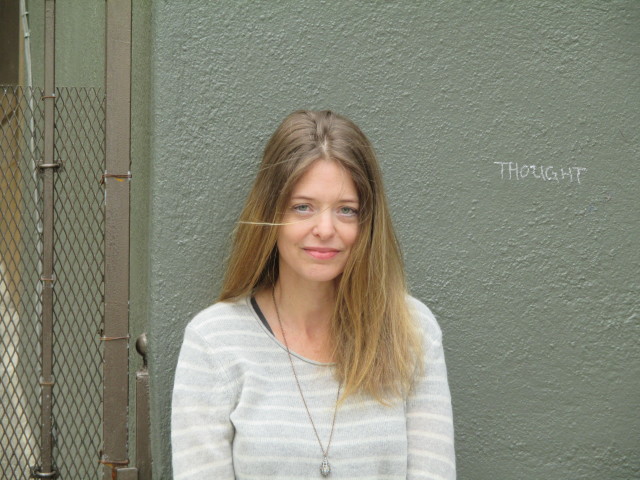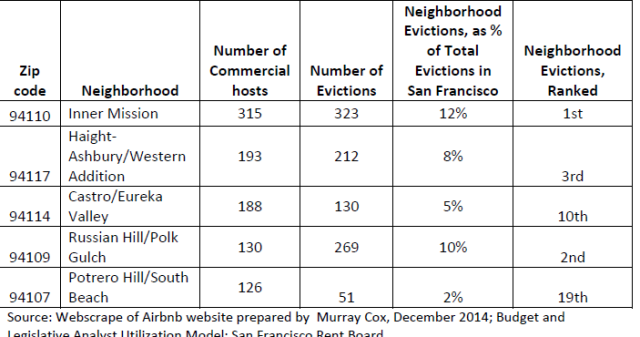As many as 30 percent of the available rentals in the Mission are off the market and used as hotel rooms; the Chiu legislation is a complete failure

By Tim Redmond
MAY 14, 2015 – As many as 30 percent of the available apartments in neighborhoods like the Mission have been taken off the market and used for short-terms rentals through platforms like Airbnb, a city study shows.
There’s also a close correlation between then number of Airbnb rentals and the number of evictions, the report shows.
The study by the Board of Supervisors Budget Analyst confirms what nearly every tenant advocate in the city has been saying for months: The regulatory legislation by then-Sup. David Chiu, which passed last year with the support of Mayor Ed Lee, has been a complete failure.
The report makes a key distinction between “casual” short-term rentals – places where existing residents occasionally rent out a room in their home to visitors – and “commercial” rentals – apartments or houses that have been converted almost entirely to hotel rooms.
If an entire place is listed on Airbnb for more than 59 nights a year, the Budget Analyst defined it as a commercial operation. For private and shared rooms in a place where a resident lives, the threshold was 89 nights a year.
It’s impossible to know exactly how many units are rented out through Airbnb, VRBO, Flipkey or other services, since those hosting platforms refuse to release that date.
By most estimates, there are at least 5,000 in San Francisco, and possibly twice that number. Share Better SF, the group that’s putting a measure on the fall ballot to more tightly regulate short-term rentals, estimates that there are 4,700 entire units – houses or entire apartments – being used exclusively for Airbnb-type rentals.
The vast majority are illegal. Under current city law, units have to be registered with the city, and only 282 registrations have been recorded with the City Planning Department.

The Budget Analyst used far more conservative numbers, assuming a total of about 6,000 units with between 2,000 and 3,000 falling into the commercial category.
But even with those numbers, the impacts are alarming. In the Haight Ashbury and Western Addition, 31.9 percent of all units that are available for rent have been turned into full-time short-term rentals, meaning they aren’t available for people desperately seeking a place to live. In the Mission, it’s 29.2 percent. In the Castro, it’s 24.6 percent.
City wide, as much as 23 percent of the available rental housing has gone to Airbnb.
It’s no wonder that rents have skyrocketed, particularly in neighborhoods with high percentages of the available housing vanishing from the rental market.
There’s a numerical correlation between the rate of evictions and the number of Airbnb listings, the report found. In the Inner Mission, for example, there were 323 evictions in 2014, and 315 units used as short-term rentals. In the Haight, there were 212 evictions, and 193 STRs.
Here’s how it works in real life.
At a press conference this morning, Susan Whetzel described how she was evicted, on what a lawsuit she’s filed claims was a fraudulent pretense, and her apartment was turned into an Airbnb rental.
Whetzel, who has lived on 18th Street for 10 years, learned in 2012 that her landlord had won a permit to convert to apartment to a condominium. That’s a legal ground for eviction, and in 2014, he tossed her out.
But she wound up staying with friends next door – “and,” she told me, “I can see the tourists coming in with their suitcases day after day.”
Whetzel, who works with autistic children, told me she will probably have to leave town and move back East because she will never find an affordable apartment.
In a lawsuit filed against landlord Peter Louie, Whetzel alleges that the condo conversion was improper: Under city law, you can’t convert a rental unit to a condo unless you live in the building. Louie told the city that he lived there, but she alleges that he never had any residency. In fact, the lawsuit claims, he was living in the East Bay with his wife and family the entire time.
“At no time during the ten years that [Whetzel] lived in the subject apartment did Louie live in the subject building,” the lawsuit states.
He certainly isn’t living there now: The place is currently listed on the Airbnb site for $250 a night.
In other words, she charges, the landlord got rid of a tenant living under rent control and paying $1,700 a month so that he could rent the place out to tourists at $250 a night. Which is roughly five times what she was paying.
Calls to Louie’s attorney were not returned. In court filings, he has denied the allegations.
At the press conference, Sup. David Campos, who requested the report, noted that the mayor is seeking a $250 million bond act this fall that would build, at most, 1,000 new units of affordable housing. “And because of Airbnb, we are seeing more than 2,000 units taken off the market,” he said.
“They are stealing our rental units,” Sara Shortt, director of the Housing Rights Committee, said.
Campos has legislation that would limit to 60 the number of days a unit can be listed on Airbnb-type platforms – but more important, would mandate that only registered units be listed and that Airbnb share with the city data on the addresses of hosted units and the lengths of time they are rented out.
There would be stiff fines for both the hosting platforms and the landlords who violate the rules.
Santa Monica has gone much further: That town has essentially banned commercial short-term rentals. A similar proposal is on the agenda in West Hollywood.







